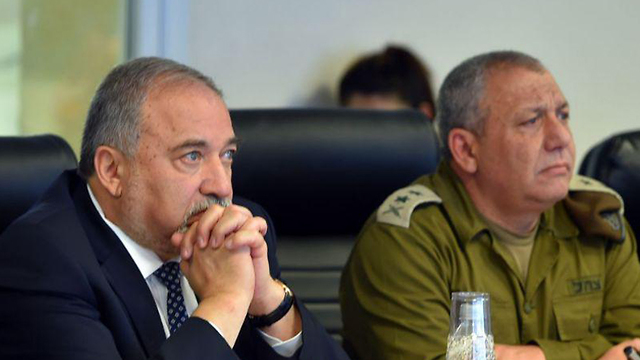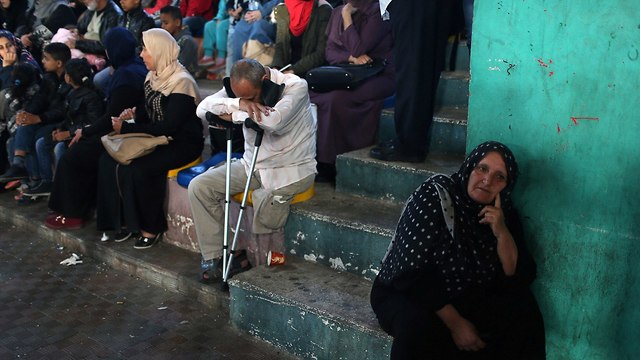

Lieberman, Eisenkot lock horns over Gaza dispute
‘Embarrassing' disagreement breaks out during Security Cabinet meeting when IDF chief advocates delivering humanitarian relief to economically stricken Gaza Strip, despite defense minister’s opposition; to ministers’ dismay, IDF says prospect of delivering economic relief isn’t contingent on return of remains of Israeli soldiers and a living Israeli citizen in Hamas captivity.
According to anonymous officials who were present at the weekly meeting, which are now held in a secure underground bunker in Jerusalem, Lieberman categorically declared his opposition to the Eisenkot’s stated position, adding that projects that were presented by the security establishment were also unacceptable. The officials described the disagreements as “embarrassing.”
The meeting mainly focused on the humanitarian crisis which continues to beset the Hamas-ruled coastal enclave and the spiralling tensions that have gripped the Gaza border in recent weeks.
Ministers, who were expecting to discuss the day’s agenda of formulating a strategic policy to remedy the crisis were said to have been shocked by the amount of time dedicated to debating haphazard and short-terms plans—some of which had already been approved the past—on water, electricity, health and employment.
To the dismay of some of the ministers present, the prospects of delivering economic relief were not contingent on the return by the Hamas terror group of the remains of Israeli soldiers and a living Israeli citizen in Hamas captivity. Moreover, no discussion was held on how to handle the fundamental problems posed by the strip. By the meeting’s end, no decisions had been taken.
The chief of staff and defense establishment’s stance, which was presented to the cabinet, dealt with solutions to the urgent humanitarian needs—water, electricity, health, food and the sewerage system—which provide life and therefore shouldn’t be contingent on returning the soldiers and citizens.
As for long-term processes—farmers, laborers, islands and opening crossings—the defense establishment’s stance is that they should be contingent on returning the soldiers and citizens.
Lt. Gen. Eisenkot told the cabinet several times that apart from the immediate steps to prevent an aggravation of the civilian situation, nothing should be done concerning the medium and long-term steps—until the soldiers’ are returned.
Lieberman addressed the issue of a humanitarian crisis in the Gaza Strip in an interview to Ynet earlier Sunday.
“First of all, we need to understand why the civil life in Gaza is so challenging, and there are reasons for that. For a start, it’s Mahmoud Abbas, who only last week transferred half the salaries for April, without talking about May, and amid the holiday Ramadan as well," he said.
“The second reason is that Hamas is not prepared to divert a single dollar from its spending on tunnels and missiles for the good of the Gaza residents," Lieberman argued. "$260 million was invested by Hamas in 2017 in building tunnels and in manufacturing rockets, and they’re not ready to spend a even dollar on health services or water and electricity infrastructure.”
The third and most important reason, he continued, was that "if the Palestinians want a humanitarian gesture, we have to get a humanitarian gesture from them in return.”
The defense minister asserted that the Gazans “don’t deserve” humanitarian relief until the bodies of IDF soldiers and the Israeli citizen Avera Mengistu which are being held by Hamas are returned to Israel.
He further claimed that Hamas only wants relief measures such as the lifting of the blockade to smuggle weapons and Iranian agents rather than to promote economic development.
Economic relief, he insisted, would not calm the situation. “Those who say it’s that simple are delusional. Like those who said 'land in exchange for peace.' We left Gaza and got missiles and tunnels in return. Anyone who preaches that economic relief will put an end to terror, to protests near the border or to incendiary kites, is wrong and misled—plain and simple. It would not make a difference to our conflict with Hamas.”
Intelligence Minister Yisrael Katz said before the cabinet meeting, “The State of Israel has been caught in an unreasonable situation in Gaza. On the one hand, we are dealing with proposals for civilian aid in the short run due to the humanitarian crisis instead of exerting significant practical pressure to return the bodies of IDF soldiers and the captives, and on the other hand, we are avoiding decisions on proper strategic solutions for the long run.”
Education Minister Naftali Bennett said, “In recent days, there has been a lot of talk on humanitarian moves towards the Gaza Strip. We must remember that some of our sons, both soldiers’ remains and Israeli citizens, are in Hamas captivity in Gaza. the formula I will advance, therefore, is humanitarian for humanitarian, and no free lunches. There is a brutal enemy on the other side waiting for signs of innocence and free gifts from our side. We shouldn’t be handing out free gifts.”
Sticks and carrots
A senior Southern Command officer presented the command’s stance to reporters last week, saying that Israel should consider an arrangement with Hamas in light of the organization’s bad strategic situation, its diplomatic isolation and the growing distress among the strip’s residents, who are yearning for an economic improvement.
The officer warned that the security stability in the strip was beginning to fall apart not because the deterrence wasn’t strong, using Defense Minister Lieberman’s rhetoric concerning Israel’s policy in the West Bank: Sticks and carrots.
“We can give small carrots,” he said. “We can be led and roll down the slope, and we can respond and enter a small or big arrangement. We can keep managing tactical incidents on the border, but in Gaza the intervals between tactical incidents and strategic events are small. We must bring stabilizers into the strip.”
The officer clarified that the IDF was prepared for a war in the Gaza Strip, saying that the operative plans for the divisions in the strip had already been approved. Since these statements, Lieberman has stepped up his tone against this approach.
Meanwhile, Prime Minister Benjamin Netanyahu's opinion on the matter hasn’t been heard. It’s quite possible that Netanyahu's stance is closer to the IDF’s than to the defense minister’s, after hearing the army’s warning signals in closed forums.
Lieberman, for his part, is insisting on separating between the economic-civilian situation in the strip its security ramifications. In any event, Israel’s channels of communications with Hamas, mainly through Cairo, remain open. The Israeli effort is to include the return of the bodies of IDF soldiers Oron Shaul and Hadar Goldin in any arrangement.
On the ground, Israel seems to be giving Hamas some room to breathe and has avoided striking in the strip in the past week in response to the throwing of explosive devices and fragmentation grenades in the border fence clashes, and well as the launching of incendiary kites and balloons.

















